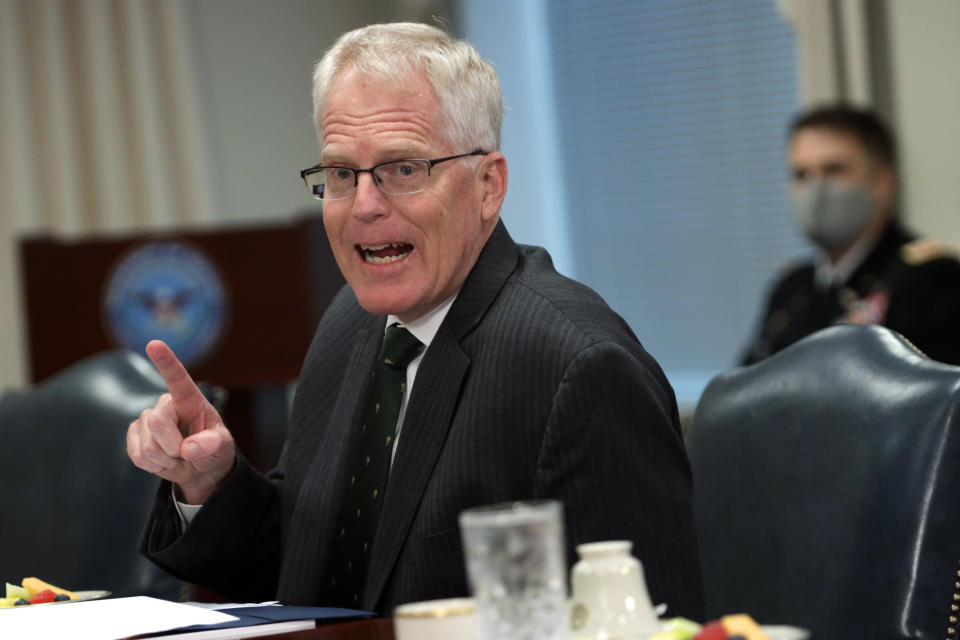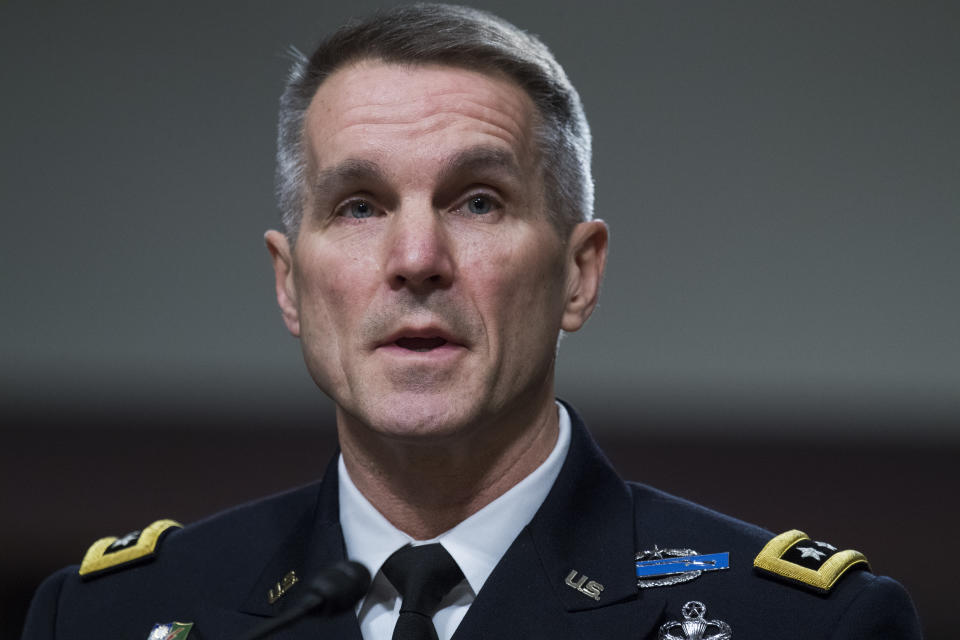Trump loyalist pushed out of White House now leading a shake-up at the Pentagon
A controversial former White House official is helping the Trump administration use its waning days to carry out a contentious reorganization that gives the Pentagon’s civilian leadership greater control over U.S. Special Operations Command.
The overhaul comes four years after Congress directed the Pentagon to give civilians more authority over special operations forces, and shortly after President Trump appointed Christopher Miller to replace Mark Esper, who was fired by tweet on Nov. 9. A retired Special Forces colonel, Miller had worked to revamp civilian oversight over special operations forces in a previous Pentagon job.
A driving force behind the current initiative is Ezra Cohen, a former Defense Intelligence Agency officer who has held several national security positions during the Trump administration and is now the acting assistant secretary of defense for special operations and low-intensity conflict, or SO/LIC.
The appointment of Cohen as the acting assistant secretary was a major factor behind the decision to implement the congressional legislation. “Ezra was critical,” said a senior Pentagon official. “We needed fresh eyes and we needed fresh energy.” Miller and Cohen had a “melding of the minds” when it came to the need to make the changes before the end of the Trump administration, the senior Pentagon official said.
Cohen, who used to go by Cohen-Watnick, was hired in early 2017 for a spot on the National Security Council staff by Trump’s first national security adviser, retired Army Lt. Gen. Michael Flynn. He was removed in August 2017 by Flynn’s successor, Army Lt. Gen. H.R. McMaster.
Cohen’s name showed up again amid allegations made by the Republican chairman of the House Intelligence Committee, Devin Nunes, who claimed that the Obama administration had spied on the Trump campaign.
In May, Trump appointed Cohen as the deputy assistant secretary of defense for counternarcotics and global threats, his third appointee job in the administration. From there he was promoted to become the acting assistant secretary of defense for SO/LIC, a position that Miller announced last week he was putting on a par with the secretaries of the Army, Navy and Air Force.
During a Nov. 18 trip to Fort Bragg, N.C., Miller stated that he was finally implementing Section 922 of the 2017 National Defense Authorization Act. That section puts the assistant secretary of special operations in the chain of command of special operations forces — between the four-star U.S. Special Operations Command (SOCOM) and the defense secretary — when it comes to manning, training and equipping the force, but not for operations.
If carried to its logical conclusion, this would give the assistant secretary’s office control over several areas, such as relations with Congress and the purchase of weapons, that are currently under the purview of SOCOM, which is headquartered in Tampa.
But SOCOM commander Army Gen. Richard Clarke, supported by Chairman of the Joint Chiefs of Staff Army Gen. Mark Milley, is resisting these efforts and will likely seek to dilute them in the coming weeks, according to current and former Pentagon officials.
“SOCOM has become a Praetorian Guard, and they don’t want to submit to anybody except Caesar,” said a former senior national security official. “It’s a knife fight right now, and SOCOM, with Milley’s support, is actively resisting the implementation of the law and the chain of command and the reforms that Congress and President Obama signed into law. It’s a pretty f***ed-up situation.”
This dynamic is not new, according to keen observers of the relationship between SOCOM and the assistant secretary’s office. “SOCOM commanders for the last couple of decades have actually actively resisted oversight from SO/LIC,” said a Pentagon official.
But a SOCOM official pushed back hard on any notion that Clarke was resistant to civilian oversight. Clarke “strongly believes that civilian leadership of the military is necessary and critical,” the official said in an emailed response to questions from Yahoo News. In addition, the SOCOM official said, the command “has always maintained a strong relationship with [the assistant secretary of defense for SO/LIC] and welcomes greater advocacy for our exceptional warfighters and their families, while continuing our history of robust civilian oversight of USSOCOM.”

Although the legislation that Miller committed to implementing is four years old, it had languished in the absence of a high-level champion within the defense bureaucracy. Several factors combined to make it suddenly become a high priority in the Pentagon in the last months of the Trump administration. One was Trump’s Nov. 9 appointment of Miller as the acting defense secretary.
A veteran of multiple combat tours who retired from the military in 2014, Miller had already served as the official performing the duties of the assistant secretary for SO/LIC earlier this year. He had also worked in and around that office on multiple occasions previously in his career, according to a Pentagon official. As a result, he was intimately familiar with the issues that Congress sought to fix.
Indeed, said a senior official in the office of the secretary of defense (OSD), the document that Miller signed in last week’s ceremony at Fort Bragg was essentially the same memo he had sent to then-Defense Secretary Mark Esper’s office before he left the assistant secretary job that Cohen now holds to become director of the National Counterterrorism Center in August. “So of course when he came in [as acting defense secretary], that’s one of the first things he did,” the senior official said. “He made it a priority.”
Cohen, who also holds the more senior job of acting undersecretary of defense for intelligence and security, is something of a lightning rod in Washington national security circles. News articles sometimes depict him as a scheming partisan with outsize influence in the Trump administration, a perception shared by some in the Pentagon.
“My theory [is] that Ezra Cohen is the most powerful person in the building at this point in time,” said a Pentagon official. But a senior OSD official described as “ridiculous” the notion that the 34-year-old Cohen wielded more power than Miller, Milley or numerous other senior figures in the department.

Miller has given Cohen’s office 30 days to finalize an “implementation memo” that will lay out the specifics on how the department will meet the intent of Congress with regard to Section 922. However, the extent to which Miller’s expansive vision in that regard will be realized now depends on negotiations between his office and Cohen’s office on one side and U.S. Special Operations Command on the other, according to Pentagon officials.
Some observers expect a fight. SOCOM commanders “see this as a zero-sum game, and they don’t want to give up any of their power,” said a former senior national security official. “They’ve grown very accustomed to SO/LIC being a kind of useless appendage and not really having to be subject to any real oversight.”
Even before delivering his speech at Bragg, Miller had removed a number of items from the document he signed because of objections from Clarke, despite the fact that the document had already been cleared by the Defense Department general counsel, according to a senior Pentagon official.
Milley, the chairman of the Joint Chiefs, also “had a couple of issues” with the draft of the memo, the senior Pentagon official said. However, “of 12 or 14 action items” in the memo, Milley and Miller “agreed to 10 or 11 of them,” said the senior official, adding that Miller was not offended by Milley’s comments.
But the perception among supporters of the steps Miller is taking is that Clarke and SOCOM remain opposed to the increased civilian oversight the acting defense secretary’s Nov. 18 announcement portended. Several cited as evidence the absence of any senior military leaders at the open-air ceremony at Fort Bragg, even though it took place at the headquarters of U.S. Army Special Operations Command.

One Pentagon official said Clarke had ordered the head of U.S. Army Special Operations Command, Lt. Gen. Francis Beaudette, to skip the ceremony. A spokesperson for Beaudette did not return a phone call seeking comment, but a SOCOM official denied the allegation.
“The signing was a policy event,” said the SOCOM official, adding that special operations forces personnel were neither required to attend nor ordered not to.
Miller’s supporters said that Special Operations Command does not want to lose certain functions like legislative affairs, acquisition authority, public affairs and the inspector general, which in the Army, Navy and Air Force typically fall under the control of the civilian service secretaries, not the uniformed leadership. One of the biggest sticking points between Miller and Clarke is “who can provide budget guidance,” the senior Pentagon official said. “Service secretaries give budget guidance down to the services,” but at present the SO/LIC office does not, the official added.
Asked whether Clarke was concerned that these functions would shift to civilian leadership under Miller’s plan, a SOCOM official said that “it would be inappropriate to speculate on the details prior to the development and approval of an implementation plan,” adding that SOCOM “looks forward to actively assisting the department in building an effective implementation plan for this policy over the next month.”
Ultimately the solution might require further legislation, in order to erase some ambiguity between Section 922 and parts of the law that deal with the SOCOM, the assistant secretary of defense for SO/LIC and the service secretariats, several officials said. But the strong bipartisan support for strengthening the assistant secretary job means the outcome is likely to last beyond the end of the Trump administration.
“We’re doing a complete solid for the next administration,” the senior Pentagon official said. “There’s no fricking way they’ll overturn this.”
_____
Read more from Yahoo News:


